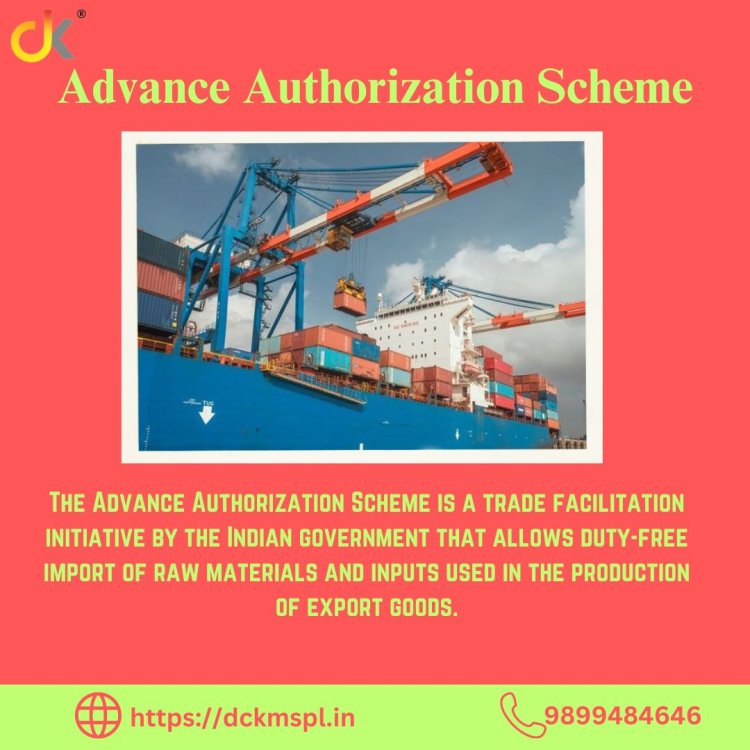Advance Authorization Scheme A Gateway to Export Excellence
The Advance Authorization Scheme allows manufacturers and exporters to import raw materials, components, and consumables without paying customs duties, provided these materials are used to produce goods for export.

In today’s globalized economy, export-driven growth has become a cornerstone of economic development. To encourage exports and enhance the competitiveness of Indian industries in international markets, the Government of India has implemented several initiatives. Among these, the Advance Authorization Scheme (AAS) stands out as a significant policy under the Foreign Trade Policy (FTP). This scheme provides exporters with the necessary support to procure essential raw materials duty-free, thereby reducing production costs and increasing profitability. Let’s delve deeper into the workings, benefits, and challenges of the Advance Authorization Scheme.
What is the Advance Authorization Scheme?
The Advance Authorization Scheme allows manufacturers and exporters to import raw materials, components, and consumables without paying customs duties, provided these materials are used to produce goods for export. This scheme is particularly beneficial for industries heavily reliant on imported inputs to maintain global quality standards. It serves as a strategic measure to enhance the cost-competitiveness of Indian exporters.Advance Authorizations are issued for inputs that are physically incorporated in export products. The scheme also permits the import of fuels, oil, and catalysts used in the production process, ensuring comprehensive support for manufacturers.
Key Features of the Scheme
-
Duty Exemption:
-
Imports under the scheme are exempt from basic customs duty, additional customs duty, and other applicable taxes.
-
Export Obligation:
-
Exporters must fulfill an export obligation equivalent to a specified percentage of the duty-free imports within a stipulated time frame.
-
Validity Period:
-
Advance Authorizations are valid for 12 months from the date of issue for imports. Export obligations must typically be completed within 18 months.
-
Transferability:
-
Advance Authorizations are not transferable, ensuring that the benefits are utilized by the intended exporter.
-
Eligibility:
-
The scheme is available to both manufacturers and merchant exporters tied to supporting manufacturers.
-
Self-Ratification Scheme:
-
Exporters with a proven track record can avail of a self-certification mechanism, reducing procedural delays.
How to Apply for an Advance Authorization
Exporters can apply for Advance Authorization through the Directorate General of Foreign Trade (DGFT). The application process involves the following steps:
-
Preparation of Application:
-
Gather required documents such as a valid Importer Exporter Code (IEC), past export performance records, and a detailed description of the export product and required inputs.
-
Submission via DGFT Portal:
-
Applications must be filed online through the DGFT portal along with the necessary fee.
-
Verification:
-
The DGFT evaluates the application to verify the authenticity and feasibility of the proposed export obligations.
-
Issuance of Authorization:
-
Upon approval, the Advance Authorization is issued, enabling duty-free imports.
Benefits of the Advance Authorization Scheme
-
Cost Reduction:
-
Duty-free imports significantly lower production costs, enabling exporters to price their products competitively.
-
Increased Profit Margins:
-
Savings on import duties enhance profitability, motivating exporters to expand their operations.
-
Ease of Doing Business:
-
Streamlined procedures and exemptions reduce bureaucratic hurdles, fostering a favorable business environment.
-
Quality Enhancement:
-
Access to high-quality imported inputs helps manufacturers produce goods that meet international standards.
-
Market Expansion:
-
Competitive pricing and superior quality enable Indian exporters to capture larger shares in global markets.
-
Boost to MSMEs:
-
Small and medium enterprises benefit immensely from reduced costs and improved market access.
Challenges Faced by Exporters
Despite its advantages, the Advance Authorization Scheme is not without challenges:
-
Complex Documentation:
-
The application process involves extensive paperwork, which can be daunting for new or small exporters.
-
Stringent Compliance:
-
Export obligations and compliance requirements may pose challenges, especially in volatile market conditions.
-
Limited Awareness:
-
Many small-scale exporters are unaware of the scheme and its benefits, leading to underutilization.
-
Delayed Approvals:
-
Bureaucratic delays in issuing authorizations can disrupt production schedules.
-
Post-Export Audits:
-
Exporters are subject to post-export audits, which can sometimes result in disputes over compliance.
Recent Developments
To address some of these challenges, the government has introduced several reforms:
-
Digitalization:
-
The DGFT portal has been revamped to facilitate online applications, tracking, and approvals.
-
Simplification of Procedures:
-
Efforts are underway to simplify documentation and reduce processing times.
-
Awareness Campaigns:
-
Workshops and seminars are being conducted to educate exporters about the scheme’s benefits and procedures.
-
Extended Validity:
-
The validity of Advance Authorizations and export obligations has been extended in specific cases, particularly during disruptions like the COVID-19 pandemic.
Impact on the Indian Economy
The Advance Authorization Scheme has made a substantial contribution to India’s export growth by enabling businesses to produce high-quality goods at competitive prices. It has:
-
Enhanced Export Competitiveness:
-
By reducing input costs, Indian products have become more attractive in international markets.
-
Stimulated Industrial Growth:
-
Duty exemptions have encouraged investment in manufacturing capabilities.
-
Employment Generation:
-
The expansion of export-oriented industries has created jobs across various sectors.
-
Foreign Exchange Earnings:
-
Higher exports translate into increased foreign exchange reserves, bolstering economic stability.
Conclusion
The Advance Authorization Scheme is a powerful tool for promoting exports and strengthening India’s position in global trade. By offering duty-free imports of inputs, it reduces production costs, enhances profitability, and fosters competitiveness. While challenges persist, ongoing reforms and digital initiatives are addressing these issues, making the scheme more accessible and efficient.For exporters looking to expand their horizons, leveraging the Advance Authorization Scheme can be a game-changer, enabling them to achieve new milestones in export excellence. As India continues to integrate with the global economy, this scheme will undoubtedly play a pivotal role in driving the nation’s economic growth.
What's Your Reaction?


















